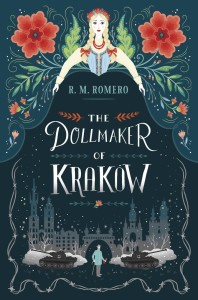The Lilith Blog 1 of 2
October 27, 2017 by Yona Zeldis McDonough
This Middle-Grade Novel Uses a Magical Doll to Confront Nazism
 In R.M. Romero’s debut middle-grade novel, Karolina is a living doll whose king and queen have been overthrown. A strange wind spirits her away from the Land of the Dolls, and she finds herself in Kraków, Poland, in the company of the Dollmaker, a man with an unusual power and a marked past. The Dollmaker has learned to keep to himself, but Karolina’s courageous and compassionate manner lead him to smile and even to befriend a violin-playing father and his daughter—that is, once the Dollmaker gets over the shock of realizing a doll is speaking to him. But their newfound happiness is dashed when Nazi soldiers descend upon Poland. Karolina and the Dollmaker quickly realize that their Jewish friends are in grave danger, and they are determined to help save them, no matter the risks. Lilith’s fiction editor Yona Zeldis McDonough talked with Romero via email about what drew her to this topic, and about the challenges of blending fantasy with fact.
In R.M. Romero’s debut middle-grade novel, Karolina is a living doll whose king and queen have been overthrown. A strange wind spirits her away from the Land of the Dolls, and she finds herself in Kraków, Poland, in the company of the Dollmaker, a man with an unusual power and a marked past. The Dollmaker has learned to keep to himself, but Karolina’s courageous and compassionate manner lead him to smile and even to befriend a violin-playing father and his daughter—that is, once the Dollmaker gets over the shock of realizing a doll is speaking to him. But their newfound happiness is dashed when Nazi soldiers descend upon Poland. Karolina and the Dollmaker quickly realize that their Jewish friends are in grave danger, and they are determined to help save them, no matter the risks. Lilith’s fiction editor Yona Zeldis McDonough talked with Romero via email about what drew her to this topic, and about the challenges of blending fantasy with fact.
YZM: What inspired you to write this novel?
RMR: When I was 18, I traveled to Kraków, Poland, and visited the Auschwitz-Birkenau concentration camp. I fell in love with Kraków, a city that fell like it had come from a fairy tale, and what I saw at Auschwitz haunted me for many years afterward. Almost a decade after that original visit, I wrote a conversation between doll who had been brought to life and the man who made her. I soon realized that this scene took place in Kraków, and the story evolved from there!
YZM: Can you talk about your research process?
RMR: In order to ensure that the story was historically accurate, I read numerous academic books about occupied Poland and the Holocaust, along with many primary sources and texts about Polish folklore (which were extremely difficult to come by in English!). I have a list of the ones I found most helpful on my website. I never would have been able to write my novel without having actually gone to Poland, however. I frequently referred to the photos I had taken and even the map I had used to navigate the city. Last summer, I returned to Kraków so I could immerse myself in it all over again while I was doing edits.
YZM: What metaphoric meanings do dolls have for you?
RMR: The odd thing about me is that, as a child, I didn’t care for dolls very much. But I’ve become extremely fond of them since I began writing The Dollmaker of Kraków! I think that dolls—and all toys, really—can be a means for children to speak their truths when they feel that they otherwise cannot, just as writing can be the way an author can present their truths to the world. My younger sister would often use her toys to make comments in a very straightforward manner, which inspired me to make Karolina—the living doll in the book—so feisty.
YZM: How did you blend the disparate worlds of fantasy and reality?
RMR: I believe that fantasy and metaphor can be powerful tools when it comes to confronting difficult topics, especially when it comes to introducing these topics to young people. Blending the two felt very natural to me in the context of the story, too. The Nazis were obsessed with destroying all aspects of Polish and Jewish culture, so in a world where magic existed, it made perfect sense to me that creatures from regional folk and fairy tales would fight back against them.
YZM: Was it difficult to present such dark material for a young audience?
RMR: It was. I didn’t want to frighten or disturb the children who read my book, but I didn’t want to sugar coat what happened to the people of Kraków—particularly those who were Jewish—under the Nazi occupation either. I sought to write about the Holocaust honestly in the hopes that by understanding the horrors that took place 70 years ago, children would choose to reject and confront anti-Semitism and racism in these troubled times.
YZM: What’s the one question you wish I’d asked but didn’t?
RMR: What is the part of the book that you feel is the most meaningful?
The answer is Chapter 28. It’s only one line, but I think it’s the most powerful part of the novel.
The views and opinions expressed in this article are the author’s own and do not necessarily reflect those of Lilith Magazine.
 Please wait...
Please wait...